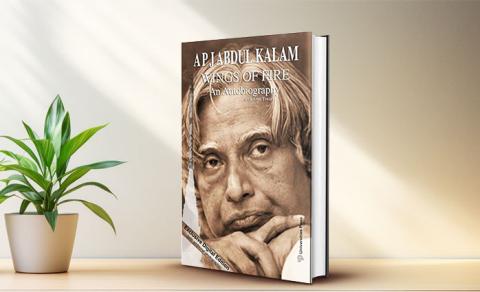Dr. APJ Abdul Kalam, fondly remembered as the “Missile Man of India,” continues to inspire millions through his autobiography Wings of Fire. Co-authored by Arun Tiwari, this remarkable book offers a profound glimpse into the life of one of India’s most iconic figures. Published originally in 1999, Wings of Fire recounts Dr. Kalam’s journey from his humble beginnings in Rameswaram to becoming a key architect of India’s space and missile programs and eventually the 11th President of India.
The book Wings of Fire is not just a narrative of achievements but a testament to resilience, innovation, and a relentless pursuit of excellence. Arun Tiwari, a missile scientist who worked closely with Dr. Kalam, adds depth to the storytelling, blending technical brilliance with heartfelt moments. The latest edition, released in 2023, preserves the essence of Dr. Kalam’s story while inspiring new generations.
In this autobiography, Dr. Kalam reflects on the blend of effort, perseverance, and destiny that guided him through his career. After graduating in Aerospace Engineering from the Madras Institute of Technology, he began his professional journey at Hindustan Aeronautics Limited (HAL), where he developed a hovercraft prototype. His career took a decisive turn when he joined ISRO, where he played a foundational role in establishing the Vikram Sarabhai Space Centre and spearheading India’s first space launch vehicle program.
Dr. Kalam’s transition to the Defence Research and Development Organisation (DRDO) marked another milestone, as he led India’s nuclear and missile programs during the 1990s and early 2000s. His instrumental contributions included the successful development of thermonuclear weapons under Operation Smiling Buddha and advancements in the Agni missile program, solidifying India’s status as a global power.
The book captures his unyielding spirit, his firm belief in the power of dreams, and his vision for a self-reliant India. Wings of Fire is not just an autobiography; it is a blueprint for aspiring individuals, showcasing how hard work, innovation, and determination can overcome even the most formidable obstacles.
From anecdotes of his childhood and education to his transformative contributions to science and technology, the autobiography paints a vivid picture of a man driven by a vision for a self-reliant India. In its 180 pages, Wings of Fire encapsulates the spirit of hard work, faith, and the inner fire that propels individuals to achieve greatness.
Availability and Details of Book
The latest 2023 edition of Wings of Fire: An Autobiography by Dr. APJ Abdul Kalam and Arun Tiwari continues to be a source of inspiration for readers worldwide. Originally published by Universities Press on January 1, 1999, the book is available in multiple formats and languages, catering to diverse preferences. The paperback version spans 180 pages, offering a compact yet detailed look into Dr. Kalam’s life and achievements. The autobiography, originally published in English, has been translated into and published in 14 languages, showcasing its widespread appeal. These include major Indian languages such as Hindi, Assamese, Bengali, Telugu, Tamil, Kannada, Malayalam, Odia, Marathi, Gujarati, and Kashmiri. Beyond Indian languages, Wings of Fire has also been translated into Chinese, titled Huo Yi by Ji Peng, as well as into French and English by various translators. This extensive linguistic reach underscores the universal relevance and inspiration of Dr. APJ Abdul Kalam’s journey.
The book Wings of Fire is available in a variety of formats to suit different reader needs. The Paperback version, priced at approximately ₹229, is ideal for those who prefer traditional physical books. The Kindle Edition, costing around ₹183, is perfect for digital readers who enjoy portability. For audiobook enthusiasts, the Audiobook format price is not available but this format providing an engaging narrated experience. The Audio CD, priced at around ₹495, caters to offline audio listeners or collectors. Additionally, there are two Hardcover editions priced at approximately ₹500 each, offering a premium and durable option for readers who appreciate quality-bound books.
With its wide availability in multiple formats and price points, Wings of Fire remains accessible and relevant, allowing readers from all walks of life to experience the extraordinary journey of Dr. APJ Abdul Kalam.
About the Authors of Book
Dr. A.P.J. Abdul Kalam, born on October 15, 1931, in Rameswaram, Tamil Nadu, was the son of a humble boat owner and imam of a local mosque. Despite his modest beginnings, he rose to prominence as one of India’s most celebrated scientists and leaders. His journey, beautifully chronicled in his autobiography Wings of Fire, showcases his dedication to science, innovation, and nation-building. He played a pivotal role in projects like the Polar Satellite Launch Vehicle (PSLV), Project Devil, and Project Valiant, and was instrumental in developing missiles like AGNI, TRISHUL, and NAG, earning him the title “Missile Man of India.” Kalam also contributed significantly to India’s nuclear tests under Pokhran-II and the Smiling Buddha initiative. His legacy is celebrated globally, with World Students’ Day dedicated to his memory.
Dr. A.P.J. Abdul Kalam, one of India’s most revered figures, was honoured with numerous prestigious awards during his lifetime, including the Bharat Ratna, India’s highest civilian award, for his remarkable contributions to science and public service. He also received the Padma Bhushan and Padma Vibhushan for his groundbreaking work in aerospace engineering and his leadership in national projects.
Kalam was the author of several inspiring books, including Wings of Fire (1999), an autobiography detailing his life and achievements, India 2020 (1998), which outlines his vision for a developed India, Ignited Minds (2002), which motivates the youth to pursue greatness, Target 3 Billion (2011), focusing on sustainable development, Transcendence (2015), which reflects on his spiritual journey, and Indomitable Spirit (2006), a collection of his thoughts and speeches.
He served as the 11th President of India from 2002 to 2007, during which he was fondly called the “People’s President” for his accessibility, humility, and efforts to connect with citizens, especially the youth. His legacy as a visionary leader and thinker continues to inspire millions worldwide.
Arun Tiwari, a renowned Indian author and missile scientist, gained widespread recognition for co-authoring the book Wings of Fire with Dr. A.P.J. Abdul Kalam. Published in 1999, the autobiography captures the inspirational journey of Dr. Kalam, from his humble beginnings to becoming India’s “Missile Man” and eventually the President of India. The book has been translated into several languages, including Chinese and French, highlighting its global appeal.
Tiwari’s collaboration with Dr. Kalam was not limited to literature; he worked closely with him in missile development projects, particularly in designing the Akash and Trishul missile systems. He made history as the first Indian to design a titanium bottle used to power missiles. Beyond his engineering accomplishments, Arun Tiwari served as the director of the Cardiovascular Technology Institute in Hyderabad, where he played a pivotal role in innovations like the Kalam-Raju stent, for which he received the Defence Technology Spin-Off Award.
Tiwari’s work not only celebrates Dr. Kalam’s life and achievements but also inspires readers to realize their potential and overcome challenges. His dual expertise in science and writing continues to leave a significant impact on both fields.
Themes Explored in Wings of Fire
The autobiography Wings of Fire by Dr. A.P.J. Abdul Kalam is a work of wisdom and motivation. This book encapsulates his incredible journey from a humble background to becoming one of the most influential personalities in India. Let us explore the prominent themes in Wings of Fire and understand how they inspire readers to dream big.
- Triumph Over Adversity: Wings of Fire vividly portrays Dr. Kalam’s struggle against odds. From selling newspapers as a young boy in Rameswaram to becoming the “Missile Man of India,” his life demonstrates the power of resilience. The book highlights how one can overcome financial hardships, societal barriers, and personal failures with determination and faith in oneself.
- The Power of Education: Education plays a pivotal role in Wings of Fire. Dr. Kalam credits his teachers and mentors, like Prof. Vikram Sarabhai, for shaping his career. The book emphasizes the importance of knowledge as a tool for empowerment and development. Dr. Kalam’s journey showcases how learning can transform lives, inspiring readers to value education.
- Leadership and Teamwork: Dr. Kalam’s experiences in leading India’s missile programs form a central theme in Wings of Fire. The book underscores the significance of collaborative efforts and effective leadership. By recounting his work with a team of unsung heroes, Dr. Kalam highlights that success is not an individual feat but a collective endeavour.
- Spirituality and Faith: Spirituality is deeply woven into Wings of Fire. Dr. Kalam draws strength from his faith and portrays a harmonious coexistence of diverse religious beliefs. His friendship with the son of a temple priest and his father’s spiritual discussions with a Hindu high priest reflect unity and mutual respect, promoting the idea of inclusivity.
- Vision for a Developed India: In Wings of Fire, Dr. Kalam shares his dream of seeing India as a self-reliant nation. Through his work in missile development and space research, he envisions an India that competes with global powers in technology and innovation. This theme resonates with his message of national pride and responsibility.
- Humility and Gratitude: Despite his monumental achievements, Wings of Fire reveals Dr. Kalam’s humility. He consistently acknowledges the contributions of his mentors, colleagues, and even his critics. This theme teaches readers the importance of staying grounded and grateful, no matter how successful they become.
- Innovation and Scientific Exploration: Dr. Kalam’s passion for science is a recurring theme in Wings of Fire. His detailed accounts of India’s missile programs, research at NASA, and contributions to aeronautics inspire readers to embrace innovation. The book encourages young minds to pursue scientific exploration as a path to progress.
- The Role of Mentors: Wings of Fire emphasizes the importance of mentorship in personal and professional growth. Dr. Kalam’s interactions with figures like Prof. Sarabhai and Dr. Brahm Prakash illustrate how guidance and support can shape an individual’s life. This theme inspires readers to seek mentors and, in turn, mentor others.
- Inspiration for the Youth: The book is a beacon of hope for young readers. Dr. Kalam’s message of dreaming big, working hard, and never giving up is at the heart of Wings of Fire. He believes every individual has the potential to create a positive impact, making this theme universally relatable.
- The Intersection of Science and Philosophy: In Wings of Fire, Dr. Kalam beautifully intertwines scientific achievements with philosophical reflections. His thoughts on destiny, purpose, and God provide a deeper dimension to his journey. This theme inspires readers to balance logic with spirituality in their lives.
- Perseverance and Hard Work: The unwavering dedication displayed in Wings of Fire underscores the theme of perseverance. Dr. Kalam’s accounts of failures and how he used them as stepping stones to success resonate strongly with readers. His journey reinforces the idea that consistent effort can overcome even the toughest challenges.
- Respect for All Religions: Dr. Kalam’s life, as depicted in Wings of Fire, advocates religious harmony. By narrating his early life in Rameswaram, where he shared a strong bond with people of different faiths, he conveys the importance of respecting diversity and fostering unity.
- Nationalism and Service to the Nation: Wings of Fire showcases Dr. Kalam’s unwavering commitment to India’s progress. His work in defence and technology reflects his dedication to making India self-reliant. This theme encourages readers to contribute meaningfully to their country’s development.
- Lifelong Learning: Dr. Kalam’s curiosity and hunger for knowledge stand out in Wings of Fire. Whether as a student or a professional, he constantly sought to learn and improve. This theme reminds readers of the value of continuous learning, regardless of age or position.
- Humble Beginnings to Great Heights: Wings of Fire inspires readers by showcasing Dr. Kalam’s journey from a small town in Rameswaram to the Rashtrapati Bhavan. His story reiterates that success is achievable with determination, irrespective of one’s background.
The themes in Wings of Fire resonate with readers of all ages, instilling a sense of purpose, resilience, and hope. Dr. Kalam’s life, as narrated in the book, encourages individuals to dream big, work hard, and lead with integrity. This book is not just a memoir but a guide to begin life’s challenges and achieving greatness.
Important Quotes from the sections of Wings of Fire that reflect Dr. A.P.J. Abdul Kalam’s Thoughts and Experiences
- On Seeing Tipu Sultan’s Legacy at NASA: “I felt overjoyed to see an Indian glorified in NASA as a hero of rocketry warfare.” By Dr. A.P.J. Abdul Kalam
[ Dr. A.P.J. Abdul Kalam recalls his time working at NASA’s Langley Research Centre in Virginia and other facilities, including the Wallops Flight Facility. During his visit to one of these facilities, he noticed a painting in the lobby that depicted a battle scene with a rocket soaring in the background. Upon closer inspection, he realized that the painting portrayed Tipu Sultan’s army fighting the British. Kalam felt an overwhelming sense of pride to see Tipu Sultan, an Indian hero, honoured in such a prestigious setting as NASA, especially in the context of rocketry and warfare, reinforcing his belief in India’s contributions to global science and technology.]
- On the Death of His Father in 1976, Kalam found solace in the words of W.H. Auden’s elegy for William Butler Yeats: “Earth receive an honoured guest; William Yeats is laid to rest: In the prison of his days, Teach the free man how to praise.”
- On Leaving Footprints in Time: “If you want to leave your footprints in the sands of time, do not drag your feet.”
— Dr. A.P.J. Abdul Kalam - On the Resilience of Life: “For all your days prepare and meet them ever alike. When you are the anvil, bear; when you are the hammer, strike.”
— Dr. A.P.J. Abdul Kalam
These quotes showcase both Kalam’s personal reflections and the moments of pride and recognition that shaped his career and personal growth. The last quote demonstrates his eloquence and poetic nature, offering powerful advice on how to face life with resilience and determination.
About Chapters of Book
In between Orientation chapters one to three, he wrote about his family, childhood, schooling and college, cousin Samsuddin and his struggle of learning and his birthplace Rameswaram. In creation section of Wings of Fire, there is chapters four to ten, Dr. A.P.J. Abdul Kalam recounts his 17-year journey from 1963 to 1980, focusing on his work at NASA’s Langley Research Centre and the Wallops Flight Facility. A memorable moment for Kalam was seeing a painting at NASA that depicted Tipu Sultan’s army fighting the British, which filled him with pride to see an Indian hero honoured in such a prestigious place.
The section also highlights Kalam’s involvement with India’s Satellite Launch Vehicle (SLV) and his crucial role in the country’s aerospace advancements. In 1981, Kalam was awarded the Padma Bhushan for his contributions, further cementing his legacy in Indian science.
Final Chapters: The Rise of the Missile Man
The Propitiation section (1981-1991) covers Kalam’s pivotal transformation into the “Missile Man of India.” He led the development of India’s first native 5 missiles Prithvi, Trishul, Akash, Nag, and Agni boosting the nation’s defence capabilities. His visionary leadership and scientific expertise were key in India’s self-reliance in missile technology.
In the book Wings of Fire by Dr. A.P.J. Abdul Kalam, there are 24 photographs included, which highlight significant moments in his life and career. These images offer readers a visual journey through his childhood, education, and professional milestones, reflecting his growth as a scientist, leader, and the President of India. The photos showcase various stages of his life, from his early years in Rameswaram, to his time at the Indian Space Research Organisation (ISRO), and his pivotal role in India’s nuclear program. Additionally, the book includes images of him interacting with key figures, both in India and internationally, as well as moments from his personal and professional life that shaped his path to becoming a global statesman.
These pictures not only provide a glimpse into the experiences that defined his character but also underscore his commitment to science, technology, and the development of India. The inclusion of these visuals adds depth to the memoir, complementing the narrative and offering a richer understanding of his journey.
Reviews on the back cover of Wings of Fire
- M S Mukunda: “There is something that everybody can extract from this book… The book is worthy of being read by every Indian.”
- M V Kamath: “Which book would you make compulsory reading? ‘APJ Abdul Kalam’s Wings of Fire’.”
- Bhawani-Prasad Chattopadhyay: “… A book worth its weight in gold.”
- Rajesh Pant: “Nothing could be more inspiring in my life than reading your autobiography.”
- Gangan Prathap: “This autobiographical account is the most inspiring one I have read in recent years.”
- Pratap Ravindran: “… I strongly suggest that one read this book.”
- Anand Parthasarathy: “…A warm and intensely personal, deeply passionate story of a common boat-owner’s son who has become India’s most distinguished living technocrat. The book is ‘all-Kalam’ in feel, reflecting his personality and mission. Kalam’s personal story is a valuable document that showcases how Indians can become world-beaters, even without foreign training or degrees. For this upbeat message alone, his autobiography is worth a hundred management books.”
Final Thoughts
Wings of Fire is an inspiring story about Dr. A.P.J. Abdul Kalam’s life, showing how he rose from a small town in Rameswaram to become a leading figure in India’s scientific achievements. His journey, filled with hard work and determination, encourages readers to believe in their dreams and never give up, no matter the challenges. The book highlights his important work in science and technology, particularly in India’s missile program. It also shares his thoughts on youth, leadership, and the power of education. Overall, this book is an inspiring read for anyone seeking motivation and a deeper understanding of India’s growth in technology.




